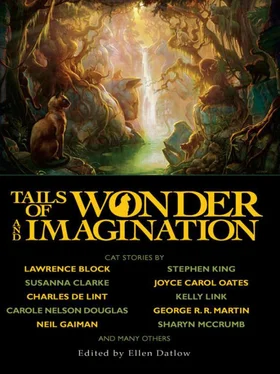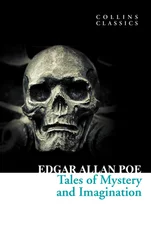Ellen Datlow - Tails of Wonder and Imagination
Здесь есть возможность читать онлайн «Ellen Datlow - Tails of Wonder and Imagination» весь текст электронной книги совершенно бесплатно (целиком полную версию без сокращений). В некоторых случаях можно слушать аудио, скачать через торрент в формате fb2 и присутствует краткое содержание. Год выпуска: 2010, ISBN: 2010, Издательство: Night Shade Books, Жанр: Фэнтези, Фантастика и фэнтези, Ужасы и Мистика, на английском языке. Описание произведения, (предисловие) а так же отзывы посетителей доступны на портале библиотеки ЛибКат.
- Название:Tails of Wonder and Imagination
- Автор:
- Издательство:Night Shade Books
- Жанр:
- Год:2010
- ISBN:978-1-59780-170-6
- Рейтинг книги:5 / 5. Голосов: 1
-
Избранное:Добавить в избранное
- Отзывы:
-
Ваша оценка:
- 100
- 1
- 2
- 3
- 4
- 5
Tails of Wonder and Imagination: краткое содержание, описание и аннотация
Предлагаем к чтению аннотацию, описание, краткое содержание или предисловие (зависит от того, что написал сам автор книги «Tails of Wonder and Imagination»). Если вы не нашли необходимую информацию о книге — напишите в комментариях, мы постараемся отыскать её.
collects the best of the last thirty years of science fiction and fantasy stories about cats from an all-star list of contributors.
Tails of Wonder and Imagination — читать онлайн бесплатно полную книгу (весь текст) целиком
Ниже представлен текст книги, разбитый по страницам. Система сохранения места последней прочитанной страницы, позволяет с удобством читать онлайн бесплатно книгу «Tails of Wonder and Imagination», без необходимости каждый раз заново искать на чём Вы остановились. Поставьте закладку, и сможете в любой момент перейти на страницу, на которой закончили чтение.
Интервал:
Закладка:
Emphasize in the campaign that Bean Bag Cats will purr, lick, nibble, and squirm just like the original model. But they will not scratch furniture, chase birds, or wander around the neighborhood at night.
FROM: Finnegan
To: Brooks
Looks terrific so far. LPL should love it. One problem. Late word from the lab says there’s a hitch in the DNA splicing for the kitties. First year’s model run will have to be surgically modified from existing stock so as to stay competitive in the marketplace. Will need some glossing. Can do?
FROM: Brooks
TO: Finnegan
No problem. Just like the suicide from drinking varnish: a horrible death but a beautiful finish.
By the by, what have you got for me after I finish pitching the Bean Bag Cats?
FROM: Finnegan
TO: Brooks
A treat.
How do you feel about Modular Dogs ®?
ANTIQUITIES
John Crowley
John Crowley was born in Maine on a World War II air base, grew up in Vermont, Kentucky, and Indiana, then went to live in New York City where he worked on documentary and commercial films and began to write novels. He now lives in Massachusetts. He is the recipient of three World Fantasy Awards (including a Lifetime Achievement Award), the Premio Flaiano “Superprize,” and an Award in Literature from the American Academy and Institute of Arts and Letters. Prominent in his ouevre are the novel Little, Big and the four-volume Aegypt series. Other works include The Translator and Lord Byron’s Novel: The Evening Land . His most recent novel, Four Freedoms was published in 2009.
“Antiquities” is in the tradition of the very popular science fiction, fantasy, and horror club or bar tale, that is, an improbable or ghostly story told around a fire in a gentlemen’s club or in a bar. Crowley reports that the central device of the story, the cat mummy mausoleum in Egypt, is actually real, and the story of how it came to England and was sold for fertilizer is also true.
“Antiquities,” the oldest story (other than the Lewis Carroll excerpt) in this volume, was originally published in 1977 by Stuart David Schiff in his classic anthology series Whispers . It seems dated not at all.
“There was, of course,” Sir Jeffrey said, “the Inconstancy Plague in Cheshire. Short-lived, but a phenomenon I don’t think we can quite discount.”
It was quite late at the Travellers’ Club, and Sir Jeffrey and I had been discussing (as we seemed often to do in those years of the Empire’s greatest, yet somehow most tenuous, extent) some anomalous irruptions of the foreign and the odd into the home island’s quiet life—small, unlooked-for effects which those centuries of adventure and acquisition had had on an essentially stay-at-home race. At least that was my thought. I was quite young.
“It’s no good your saying ‘of course’ in that offhand tone,” I said, attempting to catch the eye of Barnett, whom I felt as much as saw passing through the crepuscular haze of the smoking room. “I’ve no idea what the Inconstancy Plague was.”
From within his evening dress Sir Jeffrey drew out a cigar case, which faintly resembled a row of cigars, as a mummy case resembles the human form within. He offered me one, and we lit them without haste; Sir Jeffrey started a small vortex in his brandy glass. I understood that these rituals were introductory—that, in other words, I would have my tale.
“It was in the latter eighties,” Sir Jeffrey said. “I’ve no idea now how I first came to hear of it, though I shouldn’t be surprised if it was some flippant note in Punch. I paid no attention at first; the ‘popular delusions and madness of crowds’ sort of thing. I’d returned not long before from Ceylon, and was utterly, blankly oppressed by the weather. It was just starting autumn when I came ashore, and I spent the next four months more or less behind closed doors. The rain! The fog! How could I have forgotten? And the oddest thing was that no one else seemed to pay the slightest attention. My man used to draw the drapes every morning and say in the most cheerful voice, ‘Another dismal wet one, eh, sir?’ and I would positively turn my face to the wall.”
He seemed to sense that he had been diverted by personal memories, and drew on his cigar as though it were the font of recall.
“What brought it to notice was a seemingly ordinary murder case. A farmer’s wife in Winsford, married some decades, came one night into the Sheaf of Wheat, a public house, where her husband was lingering over a pint. From under her skirts she drew an old fowling-piece. She made a remark which was later reported quite variously by the onlookers, and gave him both barrels. One misfired, but the other was quite sufficient. We learn that the husband, on seeing this about to happen, seemed to show neither surprise nor anguish, merely looking up and—well, awaiting his fate.
“At the inquest, the witnesses reported the murderess to have said, before she fired, ‘I’m doing this in the name of all the others.’ Or perhaps it was ‘I’m doing this, Sam (his name), to save the others.’ Or possibly, ‘I’ve got to do this, Sam, to save you from that other.’ The woman seemed to have gone quite mad. She gave the investigators an elaborate and scarifying story which they, unfortunately, didn’t take down, being able to make no sense of it. The rational gist of it was that she had shot her husband for flagrant infidelities which she could bear no longer. When the magistrate asked witnesses if they knew of such infidelities—these things, in a small community, being notoriously difficult to hide—the men, as a body, claimed that they did not. After the trial, however, the women had dark and unspecific hints to make, how they could say much if they would, and so on. The murderess was adjudged unfit to stand trial, and hanged herself in Bedlam not long after.
“I don’t know how familiar you are with that oppressive part of the world. In those years farming was a difficult enterprise at best, isolating, stultifyingly boring, unremunerative. Hired men were heavy drinkers. Prices were depressed. The women aged quickly, what with continual childbirth added to a load of work at least equal to their menfolk’s. What I’m getting at is that it is, or was, a society the least of any conducive to adultery, amours, romance. And yet for some reason it appeared, after this murder pointed it up, so to speak, dramatically, that there was a veritable plague of inconstant husbands in northern Cheshire.”
“It’s difficult to imagine,” I said, “what evidence there could be of such a thing.”
“I had occasion to go to the county that autumn, just at the height of it all,” Sir Jeffrey went on, caressing an ashtray with the tip of his cigar. “I’d at last got a grip on myself and begun to accept invitations again. A fellow I’d known in Alexandria, a commercial agent who’d done spectacularly well for himself, asked me up for the shooting.”
“Odd place to go shooting.”
“Odd fellow. Arriviste, to speak frankly. The hospitality was lavish; the house was a red-brick Cheshire faux-Gothic affair, if you know what I mean, and the impression it gave of desolation and melancholy was remarkable. And there was no shooting; poured rain all weekend. One sat about leafing through novels or playing Cairo whist—which is what we called bridge in those days—and staring out the windows. One evening, at a loss for entertainment, our host—Watt was his name, and…”
“What was his name?” I asked.
Читать дальшеИнтервал:
Закладка:
Похожие книги на «Tails of Wonder and Imagination»
Представляем Вашему вниманию похожие книги на «Tails of Wonder and Imagination» списком для выбора. Мы отобрали схожую по названию и смыслу литературу в надежде предоставить читателям больше вариантов отыскать новые, интересные, ещё непрочитанные произведения.
Обсуждение, отзывы о книге «Tails of Wonder and Imagination» и просто собственные мнения читателей. Оставьте ваши комментарии, напишите, что Вы думаете о произведении, его смысле или главных героях. Укажите что конкретно понравилось, а что нет, и почему Вы так считаете.












